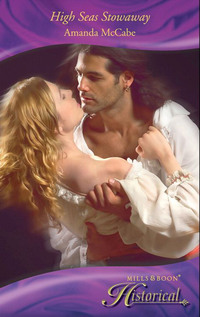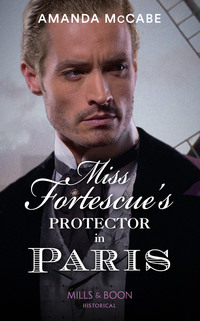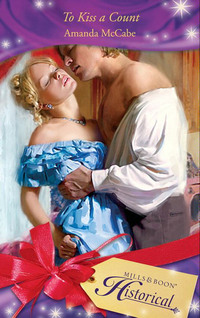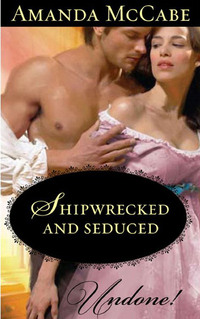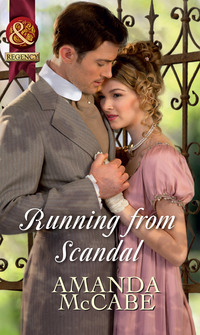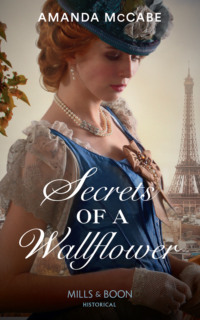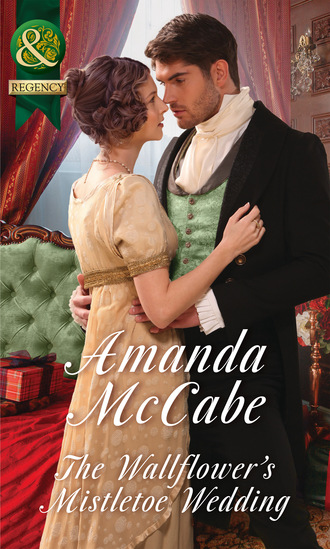
Полная версия
The Wallflower's Mistletoe Wedding
Charles was silent for a long, tense moment. ‘I would never have taken you for a fool, Harry.’
Before Harry could answer, their carriage turned through the gates of Hilltop Grange and jolted up the winding old drive, past the overgrown forest that had once been a manicured garden under the careful eye of their mother.
Now, Hilltop looked nothing like the golden welcome of Barton Park, which had seemed to float above the night like a cloud of light. Hilltop had no light at all, save the glow of one lamp in the window of the library. Harry knew that once daylight came, the overgrown ivy on the grey stone walls, the crumbling chimneys, the covered windows, would all be too apparent. He felt again that deep pang of sadness, of guilt for following a different duty.
But that one light meant their father was still awake, or more likely fallen asleep next to his empty brandy bottle. He seldom left the library now.
‘Our great inheritance,’ Charles said, his tone quiet and bitter.
Harry gave a grim nod. ‘I am sorry, Charles. I should have been here all along.’
Charles glanced at him, his expression startled. ‘Oh, no, Harry, never. You are doing what you have to—your duty to King and Country as you are called to do. No one has been more dutiful than you, ever since we were children.’
He thought again of what their home had once been, what it was now. ‘I don’t know about that.’
‘Well, I do. Whatever I face here with Father is as nothing compared to whatever you have faced all these years. Besides, I’m seldom here at Hilltop at all these days.’ He grinned and that strange, solemn, thoughtful Charles vanished. The rakish, fun-loving young man everyone knew was back. ‘London is much more diverting. Why would a man ever live anywhere else?’
‘Diverting—and expensive,’ Harry muttered, but he couldn’t help laughing at Charles’s devil-may-care smile. It was always thus with his younger brother, their mother’s golden boy. While Charles was the fun one, Harry had indeed always been the responsible one. The quiet one.
Charles shrugged. ‘What else can one do? I would be wretched in the army, worse than useless. The church would never have me.’
‘What of your painting?’ he asked, remembering the rare talent Charles once possessed with a brush, the way he could capture the mood of a landscape in a few deft strokes of paint.
Charles laughed. ‘A boy’s diversion. Not fit for a grown man, y’know.’
‘According to who? Our father?’ Harry asked quietly.
Rather than answer, Charles pushed open the carriage door as soon as they came to a full halt and jumped down. Harry followed him up the shallow stone steps into the echoing hall of Hilltop Grange. In the shadows, the portraits of their ancestors, including their golden-haired mother, watched them in silence. In the rooms beyond, the furniture was shrouded in canvas covers, like ghosts. Their mother’s cherished pianoforte was silent.
For just an instant, Harry had such a different vision of the house, light gleaming on polished wood. The warmth of the fire, the scent of flowers from the gardens, the rush of small feet down the stairs, music. But the lady who turned from the keyboard to welcome him with a smile—her eyes were the sweet, soft hazel of Rose Parker.
‘Father, wake up!’ Charles shouted, banging on the library door with his fist. The dream was shattered, like the dust of Hilltop itself.
Chapter One
Winter, three years later
‘Jouissons dans nos asiles, jouissons de biens tranquilles! Ah, peut-on être heureux, quand on forme d’autres vouex?’
‘That’s quite enough!’ Aunt Sylvia shouted from her armchair near the fire, where she was swathed in shawls and a fur blanket. Her three lapdogs shifted and barked. ‘What a wretched song by that horrid Rameau. Why would you play such a thing?’
Rose sighed and rested her wrists on the edge of the keyboard as the last notes died away in the overheated drawing room of Aunt Sylvia’s vast house. She would have laughed if she wasn’t quite so tired. She removed her spectacles and rubbed at her eyes. In her years of working as Aunt Sylvia’s companion, she had come to learn no moment was predictable. A favourite food one day, which had to be ordered from London and fetched from the village shop, a two-mile walk, by Rose every day, would not be wanted once it arrived. An expensive pelisse would be dismissed as too itchy, then needed again. The wheeled Bath chair would have to be fetched for a walk in the garden, only to be greeted with shouts of ‘What do you think I am, an old invalid? I shall walk! Give me your arm immediately, Rose. You cannot be rid of me so easily, you know, you silly girl.’
Rose did not want to be rid of Aunt Sylvia. She paid a wage that kept Rose’s mother in her cottage, now that Lily and Mr Hewlitt had two children to take care of in their small vicarage and Mama’s small income seemed even smaller than ever. Her mother deserved to stay in her own home and Rose had to work to make it so. But Rose did wish Aunt Sylvia would make up her mind for once.
‘I thought you always enjoyed the old French songs, Aunt,’ she said. ‘Because they reminded you of your time at Versailles.’
In her youth, Aunt Sylvia had once waited upon Queen Marie Antoinette, before she married the wealthy Mr Pemberton and returned to England. She spoke of it all the time and definitely never let anyone forget it, with her grey hair piled high and panniers strangely paired with newer, higher waists and puffed sleeves.
‘Why would I want to hear songs that remind me of such a terrible loss?’ Aunt Sylvia said, thumping her walking stick on the floor. One of the dogs barked. ‘You young people, you know nothing of such things. Nothing of how fortunate you all are.’
Rose suddenly remembered Captain St George and their dance at the midsummer party so long ago, the haunted look in his dark eyes as he mentioned battle and seemed to remember Waterloo. She had thought of him too often in the years since, especially in the long, quiet nights as she lay awake waiting for Aunt Sylvia to call her. Had he married the beautiful Miss Layton, had he come back from battle and found peace at last? She couldn’t help but hope so.
She glanced out the window, out the slim rectangle of thick glass revealed between the heavy brocade curtains Aunt Sylvia kept closed all the time. It had started snowing, a light, lacy, delicate pattern of white against the night sky. It reminded her that it was nearly December, nearly the Christmas season, and she wondered what her mother, what Lily and her little family, were doing now.
Lily and her babies were surely decorating their small sitting room with greenery, baking plum cakes to carry to Mr Hewlitt’s parishioners. Perhaps her mother was embroidering new little gowns to wrap up for her grandchildren’s gifts.
She felt the familiar pang of sadness of missing them and she had to remind herself why she had to work in the first place.
‘Perhaps I could play you a Christmas carol or two, Aunt Sylvia?’ she said. ‘It is nearly that season.’
‘Christmas!’ Aunt Sylvia cried. ‘Don’t even talk to me about the wretched thing. Play some Mozart. You know how I always like that.’
Except for when she called Mozart an overrated performing monkey of a boy. Rose smothered a laugh, and launched into the ‘Allegro’ from Marriage of Figaro. Just as she always could, she soon lost herself in the music, and the harsh world of Aunt Sylvia’s house, her loneliness for her family, vanished. She floated in her own realm, above everything else.
One day, she thought with a happy smile, perhaps she would have her own home with her own pianoforte. Could play whatever she chose, while her family listened...
The piece ended and Rose felt as if she was pushed out of that magical, floating world into the stuffy drawing room. Suddenly all she could hear were the snores of her aunt, mixed with the softer snuffles of the dogs and the crackle of the flames as a log collapsed into ashes in the grate. She remembered how her childhood home had once collapsed, how such things were always dreams.
She peeked over her shoulder to find Aunt Sylvia had indeed fallen asleep, her head lolling back on her cushioned chair. Hardly daring to breathe, for fear she would awaken everyone and prolong the evening, Rose carefully lowered the lid of the pianoforte over the keys and slid off the stool. She cautiously tiptoed over to make sure Aunt Sylvia’s shawls were still warmly tucked around her, and then crept out of the drawing room. She found Miss Powell, her aunt’s long-suffering maid, waiting outside.
Rose gave her a nod, which Miss Powell tersely returned, and at last Rose could make her way up the stairs to her own chamber. It was not a large room at all, barely big enough for a narrow bed, a washstand and her trunk, and it looked down on the frost-covered kitchen gardens, but it was at least her own. In the cottage at home, she had shared with Lily until they could build on an extra room and her sister’s feet at night were always freezing.
And then she missed her sister and mother all over again.
‘Don’t be such a goose,’ she told herself sternly. Surely it was only the Christmas season making her feel so melancholy now, so homesick. She had too much to do to worry about Mama and Lily now. Aunt Sylvia would want her up early as usual, writing letters and walking the dogs.
As she dug around in her clothes trunk for her night chemise, hoping her sheets wouldn’t be too chilled by the time she crawled between them, there was a knock at the door. Surprised anyone would be about at that hour—Aunt Sylvia dined early and only Miss Powell stayed up to help her retire—she hurried to answer it.
One of the young housemaids stood there, yawning into her apron. ‘Beg your pardon, miss, but these came for you by the afternoon post, but I forgot to give them to you. We do get that busy with the tea things...’
Rose shuddered to remember the row with Aunt Sylvia and the undercooked almond cakes that afternoon. ‘That is quite all right, thank you.’ She took the letters eagerly as the maid hurried away.
One from Lily, she saw, recognising her sister’s hurried scrawl. And one with a grander seal, pressed into fashionable green wax. Barton Park, the return address read.
A letter from Barton! Rose felt the warm touch of excitement, and not a little tinge of curiosity. She hadn’t heard from Barton Park in quite some time. She knew Jane had been busy with having little heirs to the earldom, and Emma had recently married David Marton, one of their neighbours.
Rose quickly changed into her nightdress, carefully laying aside her sensible grey-silk gown, and climbed into bed to read the precious missives. She opened the one from Barton first. It was written in elegant dark green ink on thick, creamy stationery.
My dear Miss Parker—or may I call you Cousin Rose?
I am so sorry we have not met since Cousin Lily’s wedding. We do miss your family so much and speak often of how your letters make us laugh. Your tales of being with Aunt Sylvia—dear lady, but, well, she is Aunt Sylvia after all—are better than a comic novel and cheer us to no end. You are a brave lady indeed.
We also speak often of that lovely midsummer ball when Lily and her vicar became engaged. It seems so very long since Barton has enjoyed such an evening.
Hayden has duties in the House of Lords which often take him to London, and as you know we now have four dear children—William, Eleanor, Emma and baby Edward.
Emma and David are also expecting a happy occasion soon and Emma still has her little bookshop in the village. She does insist on scrambling up and down the library ladders, frightening her husband no end, but she declares she has never felt better in her life!
I do envy her. My own times bring nothing but sleepiness. I often nod off by the fire quite like Aunt Sylvia!
Rose smiled at the image of Jane, nodding off by the fire as her children dashed about. She pushed away the hint of envy such an image gave her and continued reading.
In short, dear Cousin Rose, I have a great favour to ask. Emma and I have decided to revive our old Barton parties, this time for the Christmas holidays. It has indeed been a long time since we had such festivities here and the children would so enjoy it.
Their governess, though, wishes to return to her family for a few weeks and I am quite overwhelmed. If Aunt Sylvia could spare you, and if you think you could bear us and our noise, would a position here suit you for a time?
I remember how you loved music and my own little Eleanor shows great talent at the pianoforte and harp already. Aunt Sylvia is, of course, invited as well, if she can ever leave her own hearth. Fingers crossed that she is quite comfortable in situ, though!
I do hope so, dear Rose, as we would dearly love to see you again and have your assistance with our little monsters. If you like us, perhaps a longer stay here at Barton might be possible?
With much hope,
Your cousin, Jane Ramsay
Rose lowered the letter with a thoughtful frown. She well remembered when they discovered the disaster of her late father’s debts, the wreck of her mother’s annuity and the near loss of their cottage. Jane had been all that was kind at the time, offering assistance of every sort from financial gifts to a new home at Barton. Yet Rose and her mother had been so loathe to take charity, even from family. The position with Aunt Sylvia was just that—a position, with wages for tasks and long hours. Not perfect, not merry or fun, but it got them by and let her mother stay in her home.
She wondered if Jane’s offer now was also charity, carefully disguised as a temporary governess–music teacher position, but she found she didn’t quite care. She closed her eyes and remembered Barton Park, how pretty it was, how welcoming, how full of fun. She remembered her dance there with Captain St George, the bright, hopeful way he had made her feel. Maybe she would find a spark of that again, there at Barton at Christmas?
She tucked the letter under her pillow, along with Lily’s to save for a morning treat, and blew out her candle. She closed her eyes again and hoped to dream of music and mistletoe and dances with handsome partners...
* * *
‘Jane, surely it is nearly midnight. Put that away and come to bed,’ Hayden Fitzwalter, Earl of Ramsay, said, patting at the feather pillows next to him on their large, luxurious feather mattress.
Jane laughed, but she didn’t look up from the pile of papers on her writing desk. She knew if she saw her gorgeous husband, his dark hair tousled, half-naked in their lovely warm bed, she would never finish her work at all. Even after years of marriage, those gorgeous blue eyes of his were too tempting indeed.
‘I only have a few more invitations to write and they must go out with the morning post,’ she said, her pen scratching over her creamy paper. ‘We are going to have the grandest Christmas house party Barton Park has ever seen! We will have carols and wassail, and sleigh rides...’
Hayden laughed. ‘Sleigh rides? What if there is no snow, my love?’
‘Then we shall make some. It’s the first Christmas we’ve all been together at Barton in ages.’ They spent most of their time now in London, or at Hayden’s earldom seat. But Barton, where her own parents had once been so happy and raised Emma and herself in a golden childhood, was always home. ‘When Emma and I were children, our parents made the holidays so magical. Such games and music, and wonderful sweets on the tables. Green wreaths and dancing. I want it to be just like that now for the children.’
‘And so it shall be, if you will it so. Everything you create in our lives is magic, my love.’
She looked over at him and smiled. ‘Our lives are magical—now. If I can help someone else find the same thing...’
‘Ah, I see.’ His tone was full of smug satisfaction and he crossed his arms behind his head as he laid back on the pillows. ‘Trying a bit of matchmaking, are you? Who do you and Emma have in mind now?’
Jane pursed her lips. ‘No one at all, of course. If people just happen to meet at our party and just happen to like each other—well, how can that be a bad thing? Magical things do happen at Christmas.’
‘So they do. Who are you inviting, then?’
Jane glanced over her list and named a few of their London friends she thought might enjoy Barton. Her old family house was small compared to Hayden’s grand seat and there was not space for very many. There was definitely no space for Hayden’s old rakish friends, from the dark days before they mended their marriage and started their family.
‘Also, Mr and Mrs Hewlitt, though I’m not sure he can be spared from his clerical duties for the holiday,’ she said.
‘That is too bad. I remember when they became betrothed at Barton.’
‘I know, wasn’t it terribly sweet?’ Jane said. ‘I also asked her sister, Miss Rose Parker. I’m sure you remember her, too.’
‘Of course. A most sensible and cheerful lady. Her performance of Beethoven at the pianoforte was impressive.’
‘I hope she is still sensible and cheerful. She has been working as companion to Sylvia Pemberton.’
‘Oh, that poor girl!’ Hayden exclaimed. ‘Will the kraken release its captive to come to Barton?’
‘I am afraid I performed a bit of a subterfuge, since I know how proud Rose is and how their family has been brought so low of late. I told her we would need a governess for the children while Miss Essex is gone for the holidays and that Eleanor shows a proficiency for music, which she does.’
‘Jane! You’ve just moved her from working for one monster to four.’
Jane laughed. ‘Hayden! They are very well-behaved children, everyone says so.’
‘Well behaved in public, maybe,’ Hayden muttered, but Jane could hear the affectionate pride in his voice.
‘The nursemaids will all still be here. I did have to lure Rose here somehow, or she wouldn’t leave Aunt Sylvia and would have a miserable Christmas.’ And there would be no chances for her to meet eligible young men if she didn’t come to the party.
‘Quite right. Who else have you invited, then?’
Jane hesitated as she looked down at the last invitation on her desk. ‘The St George brothers, at Hilltop.’
‘Is that quite wise? Harry has not been home long, and he has not received any visitors yet. He might not be quite—recovered.’
‘When Dr Heath called last week, he told me he found Captain St George’s health to be much improved last time he was at Hilltop, though not entirely as he once was, of course. A Christmas party might be just the chance to cheer him up! After all he has been through—being wounded and losing Miss Layton...’
‘You mean Lady Fallon?’ Hayden said quietly.
‘The Dowager Lady Fallon now, not that it matters,’ Jane answered. That sudden marriage, after Captain St George left for Sicily, had surprised everyone. But if Jane had learned one thing in life, it was that everyone had secrets they hid deep down inside. Everyone deserved a second chance. ‘If the Captain does not yet feel like a party, he can always refuse. But I am inviting him, as well as his brother, Charles, who I hear is back from the Continent now.’ And Charles had always been such fun; maybe Rose Parker could use a bit of that fun in her life.
‘You must do what you think best, my love. Yet now it really is time to come to bed. It grows much too late.’
‘And much too cold, with you so far over there,’ she said with a laugh, thinking how lucky they were indeed to have had their own second chance. Their life together.
She sealed up the last invitation, the one bound for Hilltop Grange, and snuffed out the candles before she hurried into the warm haven of her husband’s loving arms.
Chapter Two
‘Aye, ’tis a pity. Hilltop Grange was once so grand. Now look at it. Falling to bits.’
‘Some who has it all haven’t the sense to appreciate it. Fritter it all away. Shameful.’
‘Oh, you two,’ the barmaid tsked to the two old men as she plopped fresh pints down on their sticky, scarred table. ‘Always grumbling ’bout something and not doing a thing about it. Now that the Captain is back...’
‘Will he be any better than that brother of his? Or the father?’ one old man muttered. ‘Been gone for years, ain’t he?’
‘He has to care, doesn’t he? Hilltop is his estate now,’ the barmaid said as she turned away, wiping her hands on her apron. The two old men returned to the weather, to the threat of snow in the air.
None of them seemed to notice Harry sitting quietly in the darkest corner of the pub, the new owner of Hilltop Grange, nursing his ale and pondering what he had to do next.
He took a long drink from his tankard, but even that did not warm him. A few snowflakes drifted past the grimy windows, landing lightly on the cobbled streets of the village outside. A few people hurried past, stepping out of the greenery-bedecked shops, their arms laden with Christmas packages, laughing together in holiday cheer, brushing the snow off their cloaks and hats.
It wasn’t the grey winter sky that made him feel so cold, or the joy in the coming holiday that he saw in others but barely remembered ever having himself. It was a numbness at his very core that had probably always been there, ever since Waterloo, when he realised the true ugliness of life.
No, he thought in sudden, startled remembrance. It hadn’t always been thus. For one moment, long ago, it had lifted, like a tiny spark of sun through those clouds. When he held a hazel-eyed girl in his arms for a dance, and she laughed with him, those eyes shining with her enjoyment of the music and of all the life around them. He knew just for a small instant, with her, the sweetness he was really fighting for.
Miss Rose Parker. That was her name. And she’d looked like a rose, too, with the faint pink in her pale cheeks. Surely she was Mrs Rose Some-Other-Surname now, with a baby in her arms. Whoever he was—well, he was a lucky bloke indeed. Harry just hoped he appreciated what he had.
He touched the black patch over his lost eye, feeling the roughness of the skin around it, the scar that curved its way almost to his jaw. What would Rose Parker think if she saw him now? Would her smiles turn to startled fear, to quickly averted glances just like everyone else? Just like it had with Helen?
Harry gave a humourless little laugh. No, not Helen. She’d left long before the wounds; she’d left when someone with more to offer, with a title even, came around. Not that Harry could blame her, not a bit. Being a soldier’s wife would never have suited Helen, no matter how much she once protested otherwise, how much their families wished otherwise. And now with Hilltop in the state it was...
Harry finished his tankard and pushed back his chair. Speaking of Hilltop, he knew he should be getting back there. He had lingered in the village too long after his visit to the lawyer Mr Wall. Hilltop would never have its roof and windows fixed by sitting around in taverns. The problem was—he wasn’t sure yet how to fix it all. He knew the army, that was all. Now he had to learn how to be a landlord to a crumbled estate.
The barmaid appeared at his side. She looked at him with a twinge of pity in her eyes, but she didn’t turn away.
‘Another pint, then, Captain?’ she said. ‘Or maybe some wine? We just got some bottles, special for the season.’
He gave her a smile. ‘Not today, Nell, but next time. And it’s just Mr now, not Captain.’
He left the tavern, striding past the grumbling old men without a word and out into the world. For an instant, his eye was dazzled by the bright grey glare of the light after the dim tavern. He pulled the brim of his hat lower and raised the collar of his greatcoat against the cold breeze. He was still trying to become accustomed to the way having sight in only one eye distorted the horizon.
The village was not a large one, but it was very busy at that time of day, as shoppers finished their last-minute errands before hurrying home to their warm fires. He knew every shop from when he was a child—the butcher, where Christmas geese and hams now waited in his window, the dressmaker, where his mother had had so many gowns sewn up, the confectioner, from whom he and Charles used to steal lemon drops.


